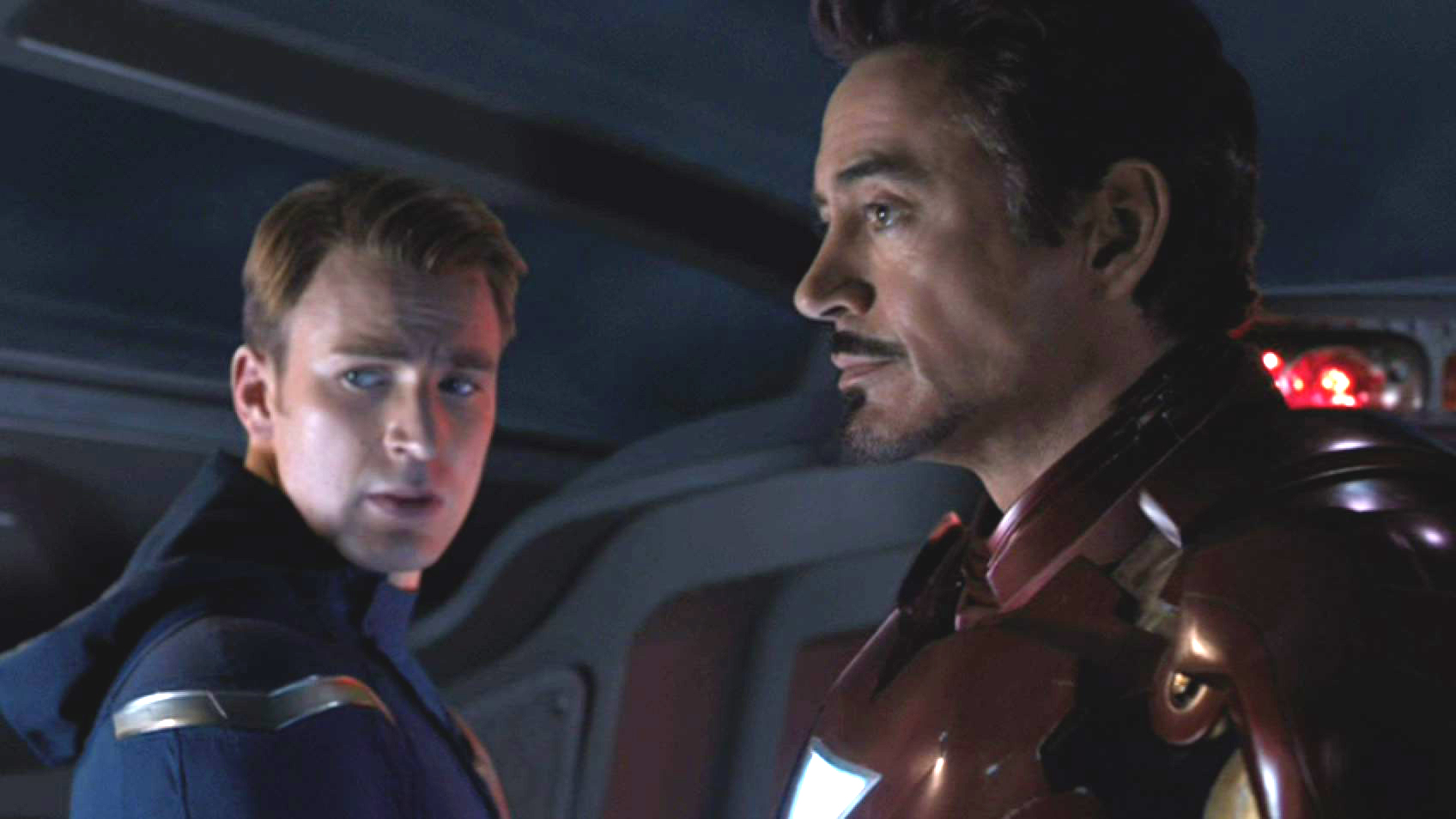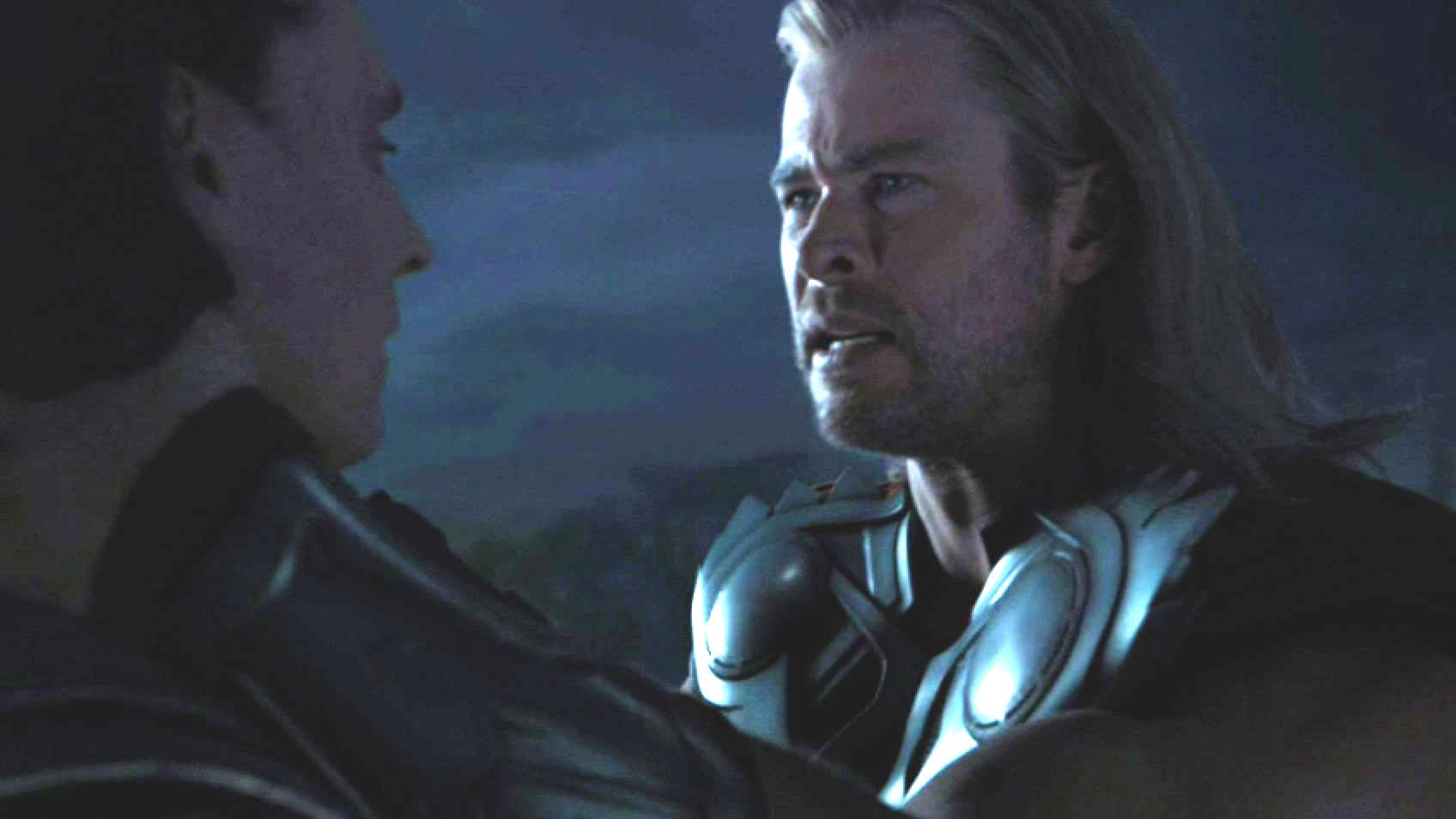The Avengers part 8
Steve Rogers and Tony Stark have teamed up to capture Loki in Stuttgart, and now share a moment on the transport back to the helicarrier. The scene highlights the difference between Steve and Tony — Steve, still an idealist, suspects something is wrong but can’t imagine that the something wrong could be on his end, while Tony, cynical billionaire, questions everything, every angle, including Nick Fury’s, especially Nick Fury’s.
Enter Thor, who nabs Loki and absconds with him. “Now there’s that guy,” sighs Tony: not even a Norse god, well, a second Norse god, can faze him.
Steve, on the other hand, isn’t impressed with Thor either, but for different reasons. “There’s only one God,” he says, “And I’m pretty sure he doesn’t dress like that.” Thor might as well be Red Skull as far as Steve is concerned: unusual, maybe, but no cause for alarm.
Why, the reasonable viewer may ask, does Thor even have to be in this movie? Surely there are enough characters to serve a narrative here. The answer, I’m sure, has to do with commerce instead of art, but the screenplay plays him beautifully — his conflict with Loki is, forgive the expression, human, in a way that superhero conflicts rarely get a chance to be. The idea of an unseen alien overlord wishing to conquer the universe is abstract in the extreme, but the idea of two super-powered brothers duking it out over bad blood is visceral, and, in its own way, warm. By making Loki the main bad guy, the movie hands the best motivation to Thor, the character who, let’s face it, is the least cool of a very cool bunch. Tony Stark wants his energy source, Steve Rogers wants to fell a potential dictator, but Thor wants to settle some hash with his brother.
Thor’s scene with Loki brings up a valid question about leadership, and about superheroics for that matter. Thor is a caring but absent god, dropping in to save this or that town or maiden, but Loki wants order, as dictators do, with himself at the seat of power. Which raises the eternal question, if Superman is capable of dispensing truth and justice, why doesn’t he? Why doesn’t he fly around the world, ousting dictators, feeding the hungry, melting the guns, dismantling the bombs, eating the plutonium, re-educating the terrorists, irrigating the Sahara? Does he not care? Between him and The Flash, they could probably make the world a paradise in an afternoon. Why doesn’t that happen?
The real answer, of course, is “But then there would be no more stories to tell,” and the comics publishers would go out of business. The more common answer is “But if a superhero solves all our problems, we no longer have free will,” which is the same argument for why God allows evil in the world. The impulse to create superheroes in the first place was a 20th-century leap of faith, new gods for a new age, an age of clear good guys and bad guys and fearsome technological advances. The Avengers makes no bones about how America has betrayed its ideals as a pillar of truth and justice, and in its shiny, pop-culture way it asks how one is heroic, what defines heroism, in this complicated time where every hero casts a shadow.
The answer for Thor, of course, which points back to Steve Roger’s comment, is that he’s not really a god, he’s a Norse god, which is a very different thing from the Christian God. Norse gods, and their pre-Christian friends from Greece, were always a very human bunch, powerful but prone to jealousies, pettiness and rages. It makes sense that Thor doesn’t do much to help the world he’s sworn to protect, he comes from a different tradition, a tradition where the gods had their fights and problems and the people just kind of had to deal with them.
Tony comes along to get Loki back from Thor, and a fight ensues, this time between god and technology. Steve Rogers may be a man out of time, but Thor is a god out of time and doesn’t have to bear Tony’s arrogance and cynicism. They fight, and Steve joins in, and Loki sits and watches instead of running away, the brawl is too entertaining to miss.
The Thor/Tony/Steve fight is a rare instance of hugger-mugger in The Avengers. “Hugger-Mugger” is what I call a bit of business that is entertaining and even spectacular, but then ends and everyone goes back to doing what they were doing before. The stakes of The Avengers don’t rise appreciably in the midst of the fight: all we really need from the sequence is for Thor to come aboard the journey. The fight brings him in in style and sets him at odds with the mere mortals who challenge him, but Loki still winds up exactly where he was before, in the clutches of SHIELD.


Your mention of the Norse and Greek pantheon reminds me of a thought I had when I read ‘Wonder Woman: Blood,’ the collection of a recent DC relaunch of Wonder Woman comics. The storyline involves Greek gods and featured some intriguingly weird designs, but I didn’t find the writer’s take on the Greek pantheon that interesting. I believe you once shared an anecdote about working on a ‘Wonder Woman’ screenplay and being told in the pitch room that there would be no Greek gods in that particular movie. (If memory serves me right.)
Anyway, it made me wonder how Thor and Wonder Woman have highly similar premises — characters who are directly or indirectly out of ancient mythology yet can come across as ‘fish out of water’ when interacting with contemporary human beings. Asgard of Thor comics strikes me as far more interesting than Paradise Island/Themyscira (sic?) in Wonder Woman comics, though. Maybe it has to do with the Jack Kirby designs of Asgard, which are dynamic mixtures of sci-fi, myth and history, while Paradise Island just looks like an island health spa. Plus, Thor has a bunch of supporting characters who are sharply distinct from one another, while Amazons of Paradise Island are practically interchangeable.
Of course, if I had to chose one of those places to VISIT, it wouldn’t be Asgard…
Yes, Joel Silver told me “there ain’t gonna be no Greek mythology” in his Wonder Woman movie. But that was a long time ago, a lot has changed in the comic-book movie world since then.
I’m not really up on Thor comics, but I think I agree with you about Paradise Island — it’s just not that interesting a place to spend time. WW is much better as a goddess in the human world, or, as Bruce Timm imagined her, a princess in the human world, with all the insularity that implies.
This is not original with me, but I do not remember where I read it. So pardon my paraphrased plagerism…
This relationship/rivalry between Steve Rogers and Tony Stark is a generational one. Steve is a FDR era Democrat, from a time when Big Government effort defeated the Great Depression and Facism. Tony is a Reagan era Republican, where government gets out of the way of the individual. Steve was part of a goverment program to create world peace, Tony “privatized” it. Steve got his superpowers via a government program, Tony fears that government will steal his powers away.
My own opinion…
Without his powers, Tony is (self described) “Genius, Billionaire, Playboy, Philanthropist”; Steve without his powers would still try to be a hero. This movie includes a ‘heroes journey’ for Tony Stark, in the end he throws himself “On the wire” for the good of the group/mission/people of New York.
Tony looks a little young to be a Reagan Republican, although his father certainly was, meaning that’s where his fortune has come from.
Yes, I can see that… I keep on forgetting “Comic-Time” is flexible. Tony Stark is Howard Stark’s son, Howard Stark was in his prime in the 1940’s, but Tony is in his prime in the 2000’s. Scenes in Iron Man 2 make it look like Tony was born in the mid-1960’s, but that can’t be right.
So, Steve is a FDR Democrat, Tony is a (small l) libertarian. Steve grows up in Brooklyn apartment, Tony’s owns a building in Manhatten. Steve is unimpressed by the man who inherited money, Tony is unimpressed by the man who was given his powers (etc).
The elephant in the room with Tony’s “libertarian” bent, is: where would the Stark family fortune have been without all those defense contracts?
Yeah, the major purpose of that fight is, quite honestly, to satisfy everybody who wants to see Iron Man and Thor and Captain America duke it out. Which I don’t begrudge: I have a particular interest in the choreography of fight scenes, and this one is excellently done, with lots of clever interaction of their various powers (Iron Man’s most of all). But the amazing thing — as with Black Widow’s introduction — is that the movie actually takes the time to have this bit of indulgence, when there’s so much else to be done.
Loki sits around not only because he wants to be captured, but because he’s temporarily the audience surrogate: dude is only lacking a bowl of popcorn as he watches the fight. 🙂
thor’s in the movie because he was in the original avengers line up. cap wasn’t. he didn’t join till issue #4